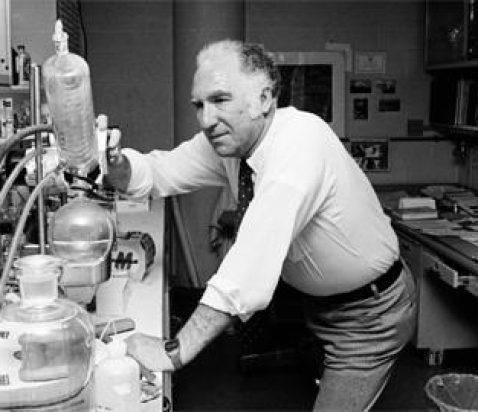
Named Lectureships

Wogan Lecture
Gerald N. “Jerry” Wogan was a pioneering scientist who isolated, characterized, and established the mechanisms of action of many environmental toxins of great relevance to global public health. His leadership on aflatoxin research, a toxin that impacts the lives of billions of people, is a paradigm for environmental toxicology. His work ranged from basic mechanistic studies at the cell level to the development of animal models of disease, the study of disease patterns in populations, and, ultimately, the development of agents that induce biochemical pathways that protect people from toxin-induced disease.
Wogan was born in 1930 in the railroad town of Altoona, Pennsylvania. His father was a railroad worker, and Wogan decided to attend Juniata College in 1947 in part because his father had a company pass that allowed him to visit his son at school. Wogan worked his way through college as a truck driver and was a member of the Teamsters’ Union. In 1951, Wogan moved on to graduate work at the University of Illinois at Urbana, where he studied physiology, biochemistry, and microbiology with eminent physiologist Robert E. Anderson, and met his future wife, Holly, a special education teacher who became a surrogate parent to generations of Wogan lab members. The two married in 1957, the year Wogan received his PhD.
After his doctoral work and a brief teaching job at Rutgers University, Wogan sat by chance on an airplane next to Institute Professor emeritus Nevin Scrimshaw, recruiting faculty for what has become the MIT Department of Biological Engineering (Course 20). Wogan so impressed Scrimshaw during that flight that he was recruited to the MIT faculty and eventually took over as department head from 1979 to 1987.
During his 60-year career, Wogan trained over 75 graduate students and postdocs, who themselves went on to become leaders in the environmental health field.
Schauer Lecture
David B. Schauer was recruited to MIT in 1993 as an assistant professor in the Division of Comparative Medicine and the Division of Toxicology, transitioning in 1998 into what is now BE. In 1999 he was promoted to associate professor, and in 2005 he became a full professor. Along the way, David became increasingly involved with undergraduate and graduate education at MIT, both in BE and institute-wide.
David’s warm personality and gentle nature evoked a sense of genuine trust and caring. His students loved him for his openness, unpretentious manner, and ability to sit down with them to discuss research projects, or talk about personal issues or life in general. This appreciation is shared by the many colleagues he interacted with not only here at MIT but also those more widely at the national and international level.
David’s research provided important insights into the molecular mechanisms evoked by enteric pathogens and how the infections caused by these bacteria perturb the gastrointestinal barrier, elicit inflammation, and produce clinically relevant disease. His scientific research is chronicled in scores of journal publications, review articles, and book chapters. Professor Peter Dedon, a colleague, describes David as a “brilliant scientist and an absolutely wonderful experimentalist.”
David’s sudden death of June 7, 2009 was a source of great sorrow for the BE community. He was known not only for his keen scientific mind, but also as a friend whose empathy and compassion touched countless individuals.
Harris Lecture
Dr. Robert S. Harris was a professor of nutritional biochemistry at MIT, where he served as faculty for 41 years until his retirement in 1969. Dr. Harris was known for his research on the roles of vitamins, minerals, fats and proteins in the metabolic process. He was a member of the Expert Committee on Nutrition of the World Health Organization, a specialized agency of the United Nations. He helped modernize nutrition or food-science departments of several universities overseas. In 1949, he established the Institute of Nutrition for Central America and Panama, which developed a nutritious substance for children of the undeveloped countries of that region.
Dr. Harris was born in Brookline, Mass., and earned his degrees, including his doctorate, at M.I.T.
Adapted from obituary by Thomas W. Ennis in the New York Times, 27 December 1983